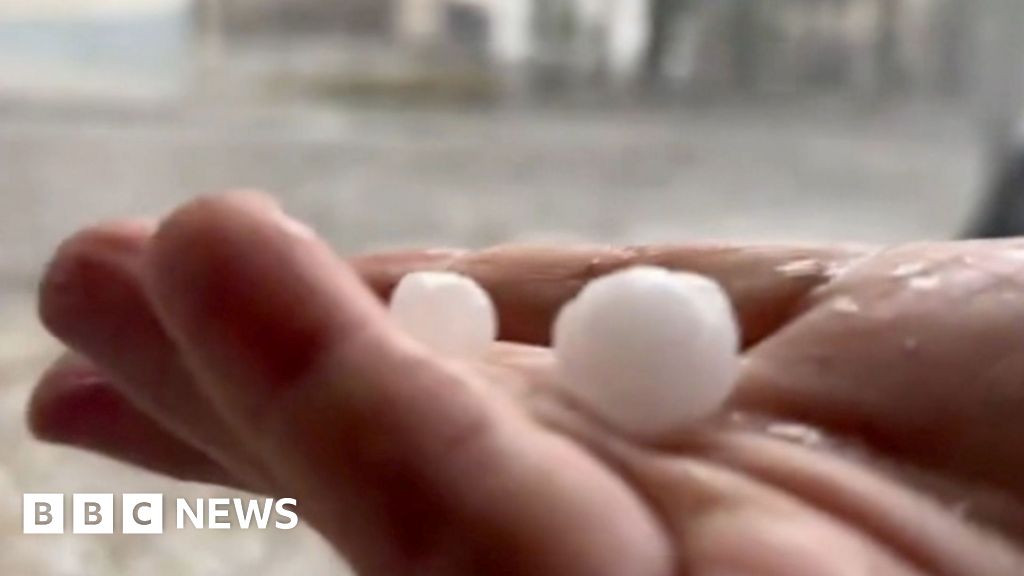Romanians are set to vote Sunday in one of the European Union member’s most important elections in decades, after the country's political landscape was upended last year when a top court voided the previous election after the far-right outsider Calin Georgescu topped first-round polls.
The decision followed allegations of electoral violations and a Russian campaign promoting Georgescu, who is now under investigation and barred from Sunday's redo. Moscow has denied it meddled.
Eleven candidates are vying for the presidency in Sunday's vote, which is expected to go to a May 18 runoff. The presidential role carries a five-year term and significant decision-making powers in national security and foreign policy.
A communist state until the end of the Cold War, Romania has spent decades trying to build strong democratic institutions. But last year’s failed election plunged the EU and NATO member country into unprecedented political turmoil.
To display this content from YouTube, you must enable advertisement tracking and audience measurement.
One of your browser extensions seems to be blocking the video player from loading. To watch this content, you may need to disable it on this site.

00:52
While data from local surveys should be taken with caution, a median of polls suggests MAGA-style hard-right nationalist George Simion will enter the runoff, likely pitting him against incumbent Bucharest Mayor Nicusor Dan, or the governing coalition’s candidate, Crin Antonescu.
Simion says it’s his duty to restore democracy and the will of the people after the previous vote was annulled. “We didn’t go from communism to democracy in 1989,” the 38-year-old leader of the hard-right nationalist Alliance for the Unity of Romanians, told The Associated Press. “The Romanian people lived the lie that we are a democratic country.”
“They voted for the change, and they were not allowed to make this change,” added Simion, who came fourth in last year’s race and later backed Georgescu. “I’m running again as a duty towards democracy, toward the constitutional order, to restore the rule of law, to restore the will of the Romanian people.”
Like other EU countries, votes for nationalists and far-right figures in recent years have grown in Romania, fueled by widespread anti-establishment sentiment.
Read moreRomanian far-right supporters hold protest rally ahead of election re-run
Simion said his AUR party is “perfectly aligned with the MAGA movement,” capitalizing on a growing wave of populism in Europe after US President Donald Trump’s political comeback. AUR rose to prominence in a 2020 parliamentary election, proclaims to stand for “family, nation, faith, and freedom,” and has since doubled its support.
Pro-Western candidates
Dan, a 55-year-old mathematician and former anti-corruption activist who founded the Save Romania Union party (USR) in 2016, is running on a pro-EU “Honest Romania” ticket. He says Romania needs a president “who has the will and the ability to reform the system.”
Veteran centrist Antonescu, 65, has campaigned on retaining Romania’s pro-Western orientation, while Victor Ponta, a former prime minister between 2012 and 2015, has also pushed a MAGA-style “Romania First” campaign and boasts of having close ties to the Trump administration.
Another hopeful, Elena Lasconi, came second in last year’s first round ballot and is running again on Sunday. She has positioned herself as a staunchly pro-Western, anti-system candidate, railing against what she describes as a corrupt political class.
“I will use every tool I have so that people’s voices are heard, in government, in Parliament, in the judiciary,” she told the AP. “Institutions must serve the people. … We need to stay close to Brussels.”
However, her chances dimmed in the rerun after her USR party withdrew its support for her in favor of Dan, claiming he had a better chance of winning. Lasconi labeled colleagues who moved against her as “coup plotters.” Her critics accuse her of being unprepared for high office.
The election redo is a pivotal moment for Romania as it seeks to restore its democracy and retain its geopolitical alliances, which have become strained since the canceled election fiasco.
The decision to annul the election and the ban on Georgescu’s candidacy have been strongly criticized by U.S. Vice President JD Vance, Elon Musk, and Russia, which publicly supported his candidacy in the rerun.
Without directly addressing Sunday's election, the U.S. Embassy in Bucharest posted a comment on Facebook, attributed to Vance, saying: “To believe in democracy means to recognize that every citizen has the right to an opinion. We should not be afraid of our people, even when they express opinions that disagree with our leadership.”
(FRANCE 24 with AP)











 English (US) ·
English (US) ·